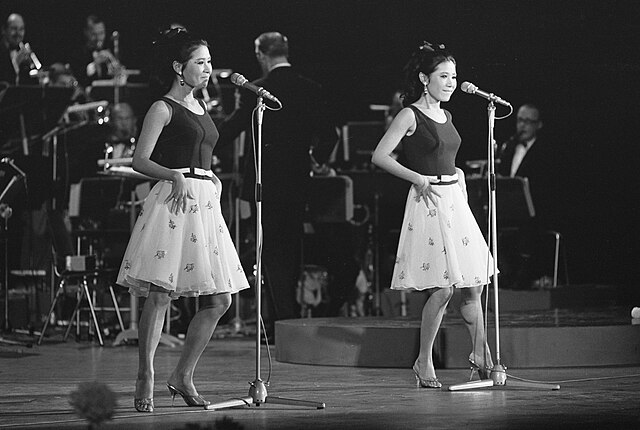Song Introduction (Koi no Fuga)
Song Title: Koi no Fuga (Title Meaning: Fugue of Love)
Artist: The Peanuts
Lyrics: Rei Nakayoshi
Composition: Koichi Sugiyama
Arrangement: Tai Misawa
Label: King Records
Overview:
Released as a single on August 10, 1967, and is part of the “Koi” series of songs, including tracks like “Koi no Ophelia.”
Source of Article:
・Koi no Vakansu – Wikipedia
・The Peanuts – Wikipedia
・Fugue – Wikipedia
・The Peanuts – Wikipedia
About the Song
The term “fuga” originally means “escape,” and in music, “fuga” (or “fugue”) refers to a compositional technique where different voices imitate the same theme in succession, creating a sense of pursuit or chasing.
Indeed, in the chorus of “Koi no Fuga,” the harmonizing voices create a powerful, approaching intensity.
The lyrics express the desire to pursue a forbidden love that was never meant to be from the start.
They begin with the powerful phrase “chase after, chase after”, reflecting the intensity of the protagonist’s feelings.
However, the song ends on a very sad note with the protagonist kissing the rain-splattered window with a farewell.
This song, covered by many artists including Yukio Koyanagi, is indeed a classic.
Song Video
- Fugue of Love – The Peanuts Single (released 1967-08-10) version
- Monument/The Peanuts Last Live! Album (2020-12-09)Version
Artist Introduction (The Peanuts)
Artist: The Peanuts
Emi Ito (real name: Hideyo Sawada, formerly Ito)
Yumi Ito (real name: Tsukiko Ito)
Birthdays:
Emi Ito: April 1, 1941 (died June 15, 2012)
Yumi Ito: April 1, 1941 (died May 18, 2016)
Hometown: Tokoname Town, Chita District, Aichi Prefecture (now Tokoname City)
Active Period: February 11, 1959 – April 5, 1975
Official Website: KING RECORDS OFFICIAL SITE
Artist Trails
Born on April 1, 1941, as twin sisters.
In 1958, they were scouted by the president of Watanabe Productions, moved to Tokyo, and received lessons from Tai Misawa.
They made their singing debut on February 11, 1959, at the “2nd Nikkei Chorus Parade” and released their debut record with “Kawaii Hana” in April of the same year.
Subsequently, they produced many hit songs including “Furimukanaide,” “Koi no Vacance,” “Koi no Fuga,” and “Jounetsu no Hana,” selling over 10 million records including singles and albums.
From June 17, 1959, to March 31, 1970, they were regulars on the music TV program “The Hit Parade,” and from June 4, 1961, to October 1, 1972, they served as the main hosts of the variety TV show “Shabondama Holiday.”
They also appeared continuously on the “NHK Kōhaku Uta Gassen” for 16 years starting from 1959.
They performed abroad and appeared on international programs like “The Ed Sullivan Show,” helping to spread Japanese pop music overseas.
On February 18, 1975, they announced their retirement at a press conference held by Watanabe Productions.
Their music has been loved by many people across generations, and their contributions to the Japanese music scene will be remembered forever.

Comment